The day had been meant for laughter. Her father had packed the cooler, loaded the fishing poles, and driven them all to the lake, his voice almost light as he gave Daniel tips and teased Elise for humming along with the radio. For a while, Miriam let herself believe this was what family felt like, her place secure beside them.
But when her line tangled and she insisted he was tying the knot wrong, his expression changed. The softness drained from his face, replaced by a sharpness that startled her. “If you know so much, do it yourself,” he snapped, thrusting the pole back into her hands. The words cut deeper than the tone, final in a way she didn’t yet understand.
The rest of the day passed in silence for Miriam. Daniel laughed, Elise skipped stones, and their father praised them both while Miriam trailed behind, her cheeks burning with questions she couldn’t name. She didn’t know it then, but that single exchange would shadow every year that followed, marking the end of the girl he once carried on his shoulders and the beginning of the distance she would never bridge.
When Miriam was very young, her father seemed steady, if not especially affectionate. He was a man of routines and measured words, but she remembered small gestures that felt like proof of care: the way he hoisted her onto his shoulders during the summer fair, how he guided her hands when she tried to skip stones, the way he tucked the blankets around her toes at night.
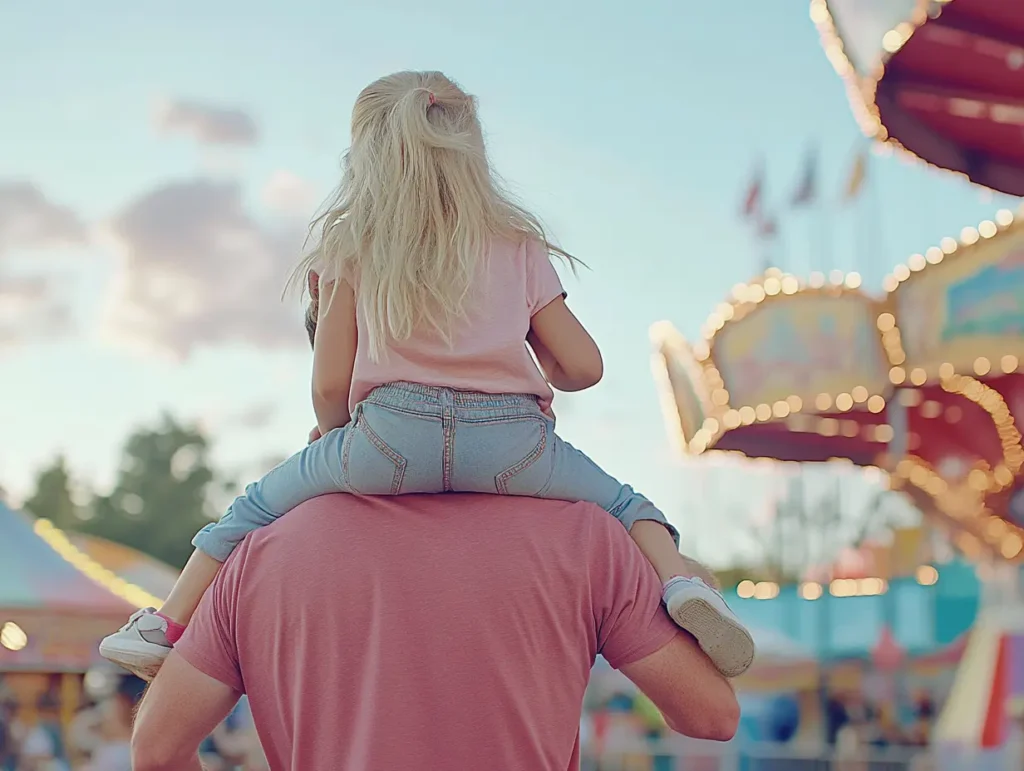
He wasn’t exuberant, not the kind of father who swept children into wild embraces, but she never doubted that he noticed her. Her early memories were colored by those simple moments of belonging.
She recalled the quiet pride in his eyes when she learned to ride her bike without wobbling, or how he once carved her initials into the handle of a jump rope so she wouldn’t mix it up with her sister’s. They were not grand displays, but to Miriam, they mattered. In those years, she believed she had a place in his regard, even if his affection was quieter than her mother’s.

But as she grew older, the balance shifted. At first it was subtle; a longer pause before he answered her questions, a distracted nod when she brought him something she had drawn, the way his voice sharpened when she lingered too long in his study. It was easy enough to dismiss as moods, the ordinary irritations of an adult with too much on his mind.
Yet Miriam began to notice how his demeanor changed depending on which child stood before him. With Daniel and Elise, his patience held. With her, it began to fray. By the time Miriam started school, the small signs had become harder to ignore. Her father still showed up at recitals and plays, but his clapping came with less enthusiasm when her turn arrived.

He smiled broadly for Elise’s solos, his eyes bright with pride, while for Miriam he offered only polite acknowledgment, as though he were applauding out of obligation. She told herself it didn’t matter, that at least he was there, but the difference carved at her all the same.
At birthdays, the gap grew sharper. Daniel’s cake came decorated with sparklers and his favorite baseball motif. Elise’s had layers of frosting, roses piped carefully in pink and white. Miriam’s was smaller, plainer, often from the bakery in town rather than the oven at home.

Her mother tried to make up for it, slipping her extra cookies after dinner, tucking notes into her lunchbox, but Miriam noticed. She couldn’t help it. Children know when they are standing at the edge of affection rather than in its center.
As she entered her preteen years, his tone with her grew more brittle. Where once he corrected her gently, he now snapped. Where once he lingered to answer her endless questions, he grew curt, waving her away. It wasn’t outright rejection, not yet, but it felt as if he was putting distance between them with every passing season.

Miriam learned to approach him cautiously, choosing her words carefully, as though stepping across a floor with hidden weak boards. What unsettled Miriam most was how differently her father treated Daniel and Elise.
With Daniel, he seemed patient even when mistakes piled up, when he tangled fishing lines or left tools scattered in the shed, their father only chuckled and shook his head. With Elise, he softened in ways Miriam had never seen, brushing stray hair from her face before a recital, waiting proudly in the wings with flowers in hand.

Miriam longed for those moments, but they rarely came. When she stumbled, the rebuke was quick. When she asked for help, his sighs came heavier. She began to measure herself against her siblings, quietly tallying every small advantage they received; a longer hug, a better gift, a softer word.
Each comparison sharpened her awareness of her own exclusion, though she could never explain why it was happening. Her mother noticed, slipping her knowing glances across the dinner table, sometimes nudging her husband with a gentle remark: “Don’t be so hard on her.”

But his only reply was silence, or a grunt, or a glance toward the attic door as though retreating into his own fortress of memory. For Miriam, the feeling was unavoidable: she was becoming a problem in his eyes, though she didn’t know what she had done to earn it.
The turning point came one summer when her father announced a trip for all three children. It wasn’t common for him to plan outings, and Miriam’s heart had leapt at the idea. They drove out to the lake, windows down, the air carrying the smell of pine and water. Daniel sprawled in the backseat, bragging about how many fish he’d catch.

Elise hummed along with the radio. Miriam pressed her forehead to the glass, thinking that maybe this time would be different, that maybe she’d get to see the version of her father who had once carried her on his shoulders. At first, it felt almost normal. He baited Daniel’s hook, showed Elise how to steady her line, even pointed out the ripples where fish might gather.
When Miriam tugged too eagerly on her pole and tangled the line, he bent down to help her untwist it. But then, when she insisted he was doing it wrong, that the knot needed to be tighter, that the bobber should sit higher, details she had overheard from Daniel, something in him shifted.

His face hardened. His voice cut sharper than she had ever heard before. “If you know so much, do it yourself,” he snapped, shoving the pole back into her hands. The others froze, unsure how to react. Miriam’s cheeks burned. She opened her mouth to apologize, but his eyes had already turned away, fixed on the water as if she had ceased to exist.
The day limped forward after that, laughter for the others, silence for Miriam. She walked a few steps behind as they packed up, her small hands fumbling with the cooler while Daniel and Elise carried gear under his approving gaze. On the ride home, he spoke freely to them, recounting the fish Daniel nearly caught, teasing Elise about her skipping stones.

He never once looked at Miriam. From that trip onward, the change was unmistakable. The warmth that had once flickered between them never returned. For years afterward, Miriam replayed that day at the lake in her mind, searching for the moment where she might have done something differently. If only she had kept quiet. If only she hadn’t corrected him.
If only she’d laughed instead of insisting. The memory carried the weight of a hinge; before it, her father had still been reachable; after it, the distance became a wall. It wasn’t just that he grew sharper with her. It was the way his patience with the others seemed to expand in contrast, as though her presence alone was the irritant.

She couldn’t understand why he had grown so short with her, why his patience frayed faster when she was the one asking questions. Each time he brushed her aside, it left her puzzled, wondering what she had done wrong this time. The harder she tried to win him back, the more he seemed to turn away.
As she moved into her teenage years, the pattern hardened. His words to her were clipped, his attention fleeting. Daniel and Elise still drew out his softer tones, but with Miriam, the air between them stayed taut, filled with something she couldn’t name.

Daniel got the car keys when he turned sixteen, Elise’s tuition was fully covered when she went to college, and Miriam received neither. “You’ll manage,” her father told her, not unkindly but dismissively, as though she were the child best left to fend for herself.
She did manage, she had no choice, but a quiet resentment coiled inside her, the ache of knowing she had once been loved and then somehow, inexplicably, lost it. By the time she left home, her relationship with her father was more absence than presence. Phone calls were brief, visits strained.

He never raised his voice to her again as he had at the lake, but he never let her back in either. What stung most was not knowing why. The attic, forever locked, loomed in her memory like the keeper of an answer she was never allowed to have. Still, the fragile rhythm of family life persisted, held together less by her father’s effort than by her mother’s quiet devotion.
It was her mother who made holidays tolerable, who urged her father into civility, who filled the house with small kindnesses that softened the edges of his silence. Without her, Miriam suspected, there would be nothing left to tether them together. When her mother died, the balance collapsed.

The warmth that had once buffered her father’s silences was gone, leaving only raw distance. Miriam’s siblings pulled away even further; Daniel moving across the country, Elise immersing herself in work, while Miriam, almost by default, became the one to linger close.
Not out of loyalty to her father, but because the absence of her mother left a hollow she didn’t know how else to fill. In those years, her father grew more brittle. His once brisk stride slowed, his hands trembled when he tried to pour his morning coffee, and the attic became an even more frequent refuge.

She’d hear him shuffling upstairs for hours, only to emerge with dust clinging to his sleeves. He never spoke of what he did there, and she never asked. But the silence between them swelled into something almost unbearable.
As illness settled into him, Miriam was the one who took him to appointments, who sat in waiting rooms with magazines she never read, who learned how to fold his prescriptions into the routine of each day. It wasn’t gratitude that kept her there, but an old hunger for recognition, a quiet hope that in the narrowing corridors of his final years, he might finally look at her differently.

One afternoon near the end, as he dozed in his armchair, Miriam gathered her courage. She had watched him cough until his chest rattled, watched his once-sharp eyes cloud with fatigue, and she knew time was slipping. “Dad,” she began, her voice low but steady, “did you ever have something against me? I mean—why was it always different with me?”
For a moment, she thought she saw something flicker in his expression. His mouth shifted as if words were pressing against his teeth, straining to be freed. Her heart leapt. She thought, perhaps, at last, he would explain, or even apologize. But then he exhaled through his nose, turned his head slightly, and muttered, “I’m tired. Let me nap.”

His hand twitched as though shooing away an insect. Miriam sat frozen, shame and disappointment colliding inside her. She had offered him a door, and he had closed it with the same quiet finality he always had. She wanted to protest, to press harder, but instead she rose, smoothing the blanket over his knees. He was asleep before she left the room.
The hope she had carried for decades sank heavy in her chest, unresolved, but not yet extinguished. When he passed a week later, it was Miriam who held his hand in those last breaths. Elise and Daniel hadn’t made it in time. She stayed until the machines stilled, until the nurses came.

And even then, even as grief cracked through her, she still whispered into the silence: “I just wanted to understand.” The funeral came quickly, a blur of black coats, pale flowers, and words that slid past Miriam without sinking in. The pastor spoke of duty and steadiness, of a man who had provided for his family and kept his faith quiet but firm.
Miriam listened with her head bowed, wondering if anyone else noticed the spaces between the lines, the silences no eulogy could reach. Elise wept openly, her handkerchief pressed to her face, while Daniel stood stiff at her side, his jaw set in a way that suggested endurance rather than grief.

They accepted condolences, thanked neighbors for the casseroles and sympathy cards, and then, almost as quickly, began to talk about flights back to their lives. Their father’s absence, for them, seemed like something to move through, not dwell on. Miriam lingered. She couldn’t leave so easily.
As the mourners drifted away and the churchyard emptied, she found herself standing before the casket longer than anyone else, her hand resting on the wood. She didn’t pray, didn’t speak aloud. She only thought of all the questions she had carried since childhood, the questions she had offered him in his final days, the questions he had turned away from.

They would never be answered, at least not by him. The days that followed blurred into a haze of paperwork and condolences. Neighbors dropped by with casseroles, their voices pitched with awkward sympathy, while the hospice nurse reminded her to drink water and sleep.
Elise and Daniel came briefly to help sort through the formalities, their faces tight with the efficiency of people who wanted grief scheduled into tidy hours before returning to their own lives. It fell to Miriam to decide what to do with their father’s things. Elise admitted she couldn’t bear to sift through them; Daniel, ever pragmatic, said, “Just donate or sell what you don’t want.”

To them, the house was little more than a shell now, its memories too sharp to linger in. Miriam couldn’t move so bluntly. Every room hummed with absence but also with secrets. The armchair still held the faint scent of tobacco, a crossword puzzle lay unfinished by the lamp, and slippers were tucked neatly under the bed as though he might shuffle back in at any moment.
She felt, more strongly than ever, that the house was watching her, waiting for her to decide whether she would finally uncover what had been kept locked away all her life. At the end of the upstairs hall, the attic door loomed, unchanged and yet transformed. For decades, it had stood as the boundary she was not allowed to cross.
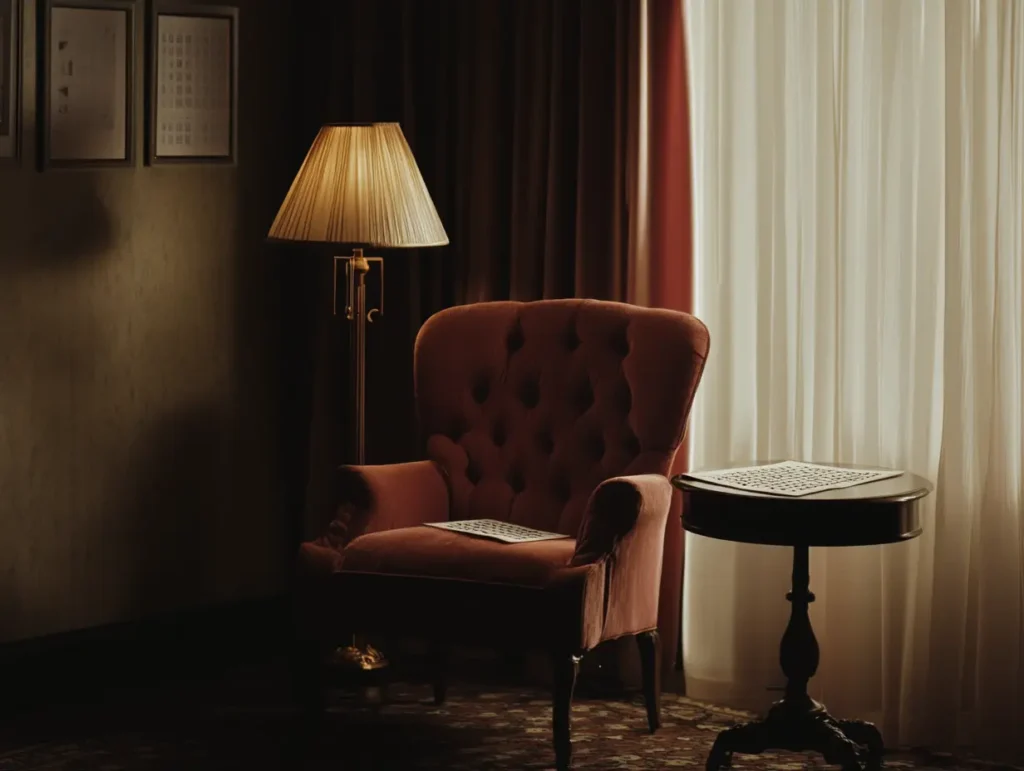
Now the key rested on the chain in her hand. She held it for a long moment, the weight of it pressing into her palm, as if she were holding not metal but permission. Slowly, she fitted it into the lock. The click echoed down the corridor, sharp and final.
The door swung open with a groan, releasing air that smelled of dust and something faintly medicinal, like a room preserved too long. Light filtered in from a small window, catching the particles that hung suspended in the air. Boxes lined the eaves in precise stacks, the kind of careful order her father had always kept.
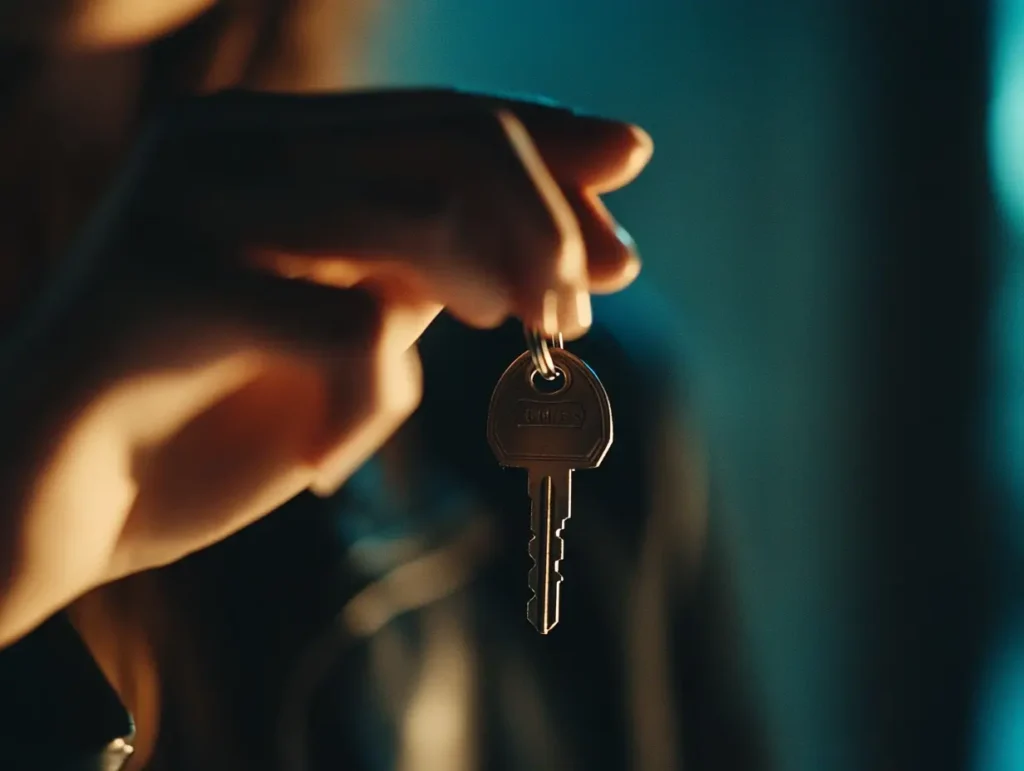
Miriam stayed at the threshold, her hand still on the knob. The attic looked harmless enough, just cardboard, trunks, the clutter of a life, but her chest tightened as though she were trespassing. She couldn’t help recalling how fiercely her father had guarded this space. The way his voice sharpened when anyone so much as brushed against the door.
The nights she had heard his footsteps creaking overhead, his long hours of pacing that ended in silence when the rest of the house was asleep. As a child she had once crept up the stairs and pressed her ear to the wood, straining to catch even a whisper. She had imagined treasure then, or maybe tools too dangerous for children.
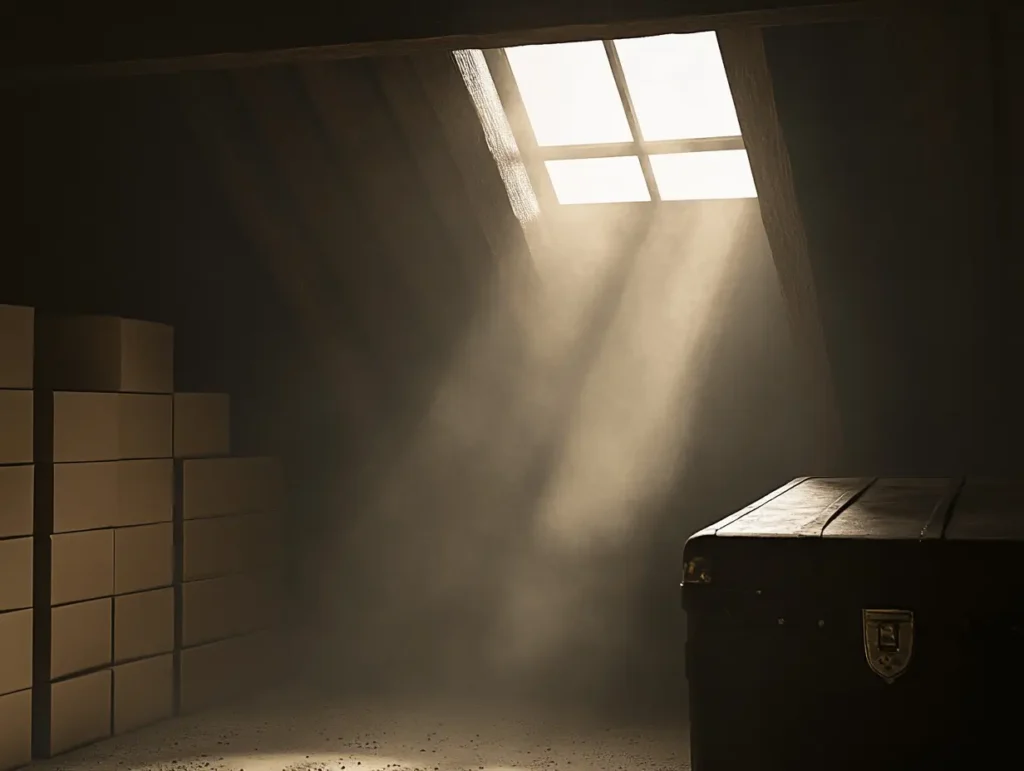
Now, standing inside at last, she knew it was neither. Whatever he had hidden here, it was heavier than things. She hesitated to move forward, almost expecting him to appear in the doorway, to scold her as he once had. The thought made her pulse quicken. She was no longer a child, yet the old fear returned, mingling with grief in a way that hollowed her out.
She took one careful step inside, her shoes crunching against the boards, and felt the weight of her father’s silence pressing in around her. In the far corner, half-shadowed beneath the slant of the roof, stood a trunk. Its leather edges were worn smooth, brass studs dulled with age, but there was a strange care in how it had been kept.
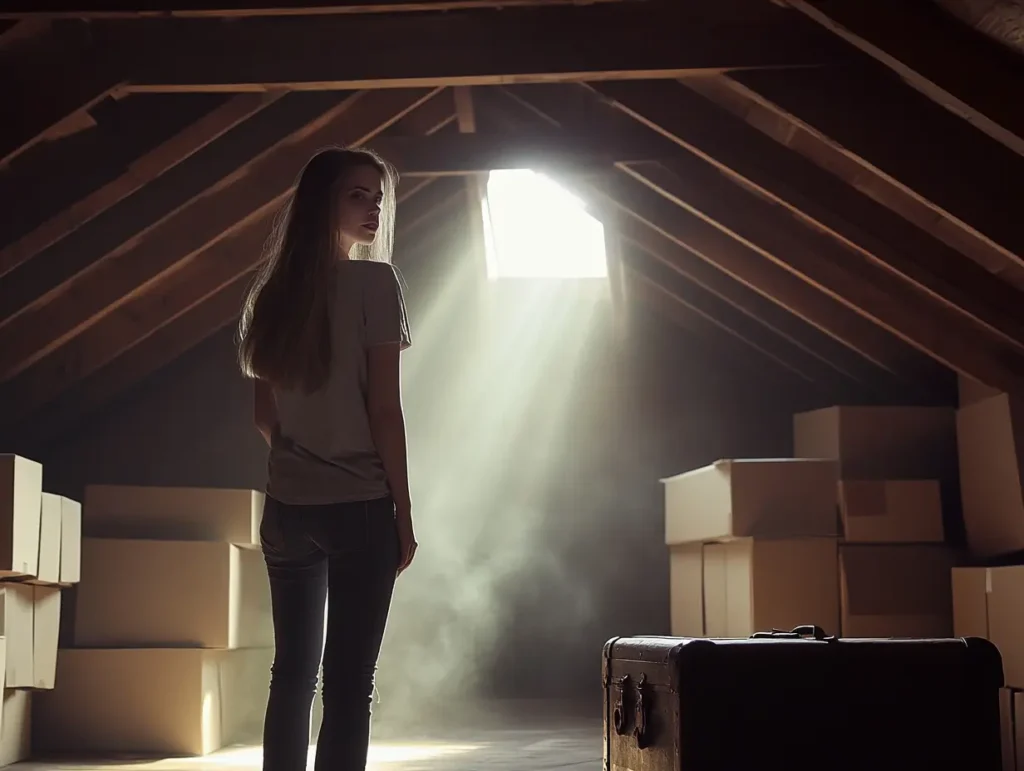
Dust coated the lid, yet the corners gleamed faintly, as though his hands had polished them in secret. Beside it sat a smaller box, tied with twine that had frayed down to threads. The handwriting across the lid was unmistakably his, neat but forceful, each letter pressed down as though to make the name permanent: Ruth.
Miriam’s breath caught. The name was unfamiliar, foreign in her family’s story. She whispered it aloud, and the sound seemed to thrum against the walls, unsettling the quiet. She could not remember ever hearing it spoken in their house, not once. Yet here it was, scrawled with the finality of something that had always been there, waiting.
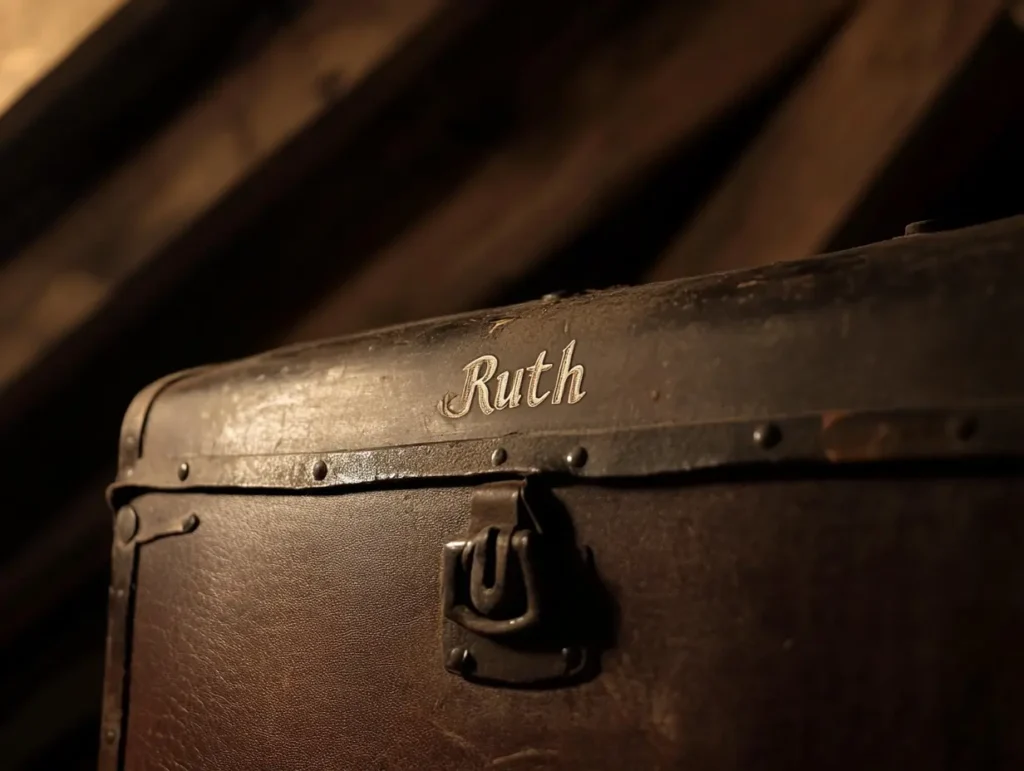
Her fingers hovered above the twine, but she pulled back. Instead, she pressed her hand against the cool leather of the trunk. It felt solid, almost alive with the residue of years. She knew, with a certainty that made her shiver, that whatever answers her father had withheld, the reason for his distance, the silence that had shaped her childhood, were locked in here.
Her eyes stayed fixed on the word as if it might rearrange itself into something less ominous. Ruth. The longer she stared at it, the more it seemed to expand, filling the attic with possibilities she didn’t want to name. A tremor of panic threaded through her. What if Ruth had been someone else in his life; a woman he had loved in secret?
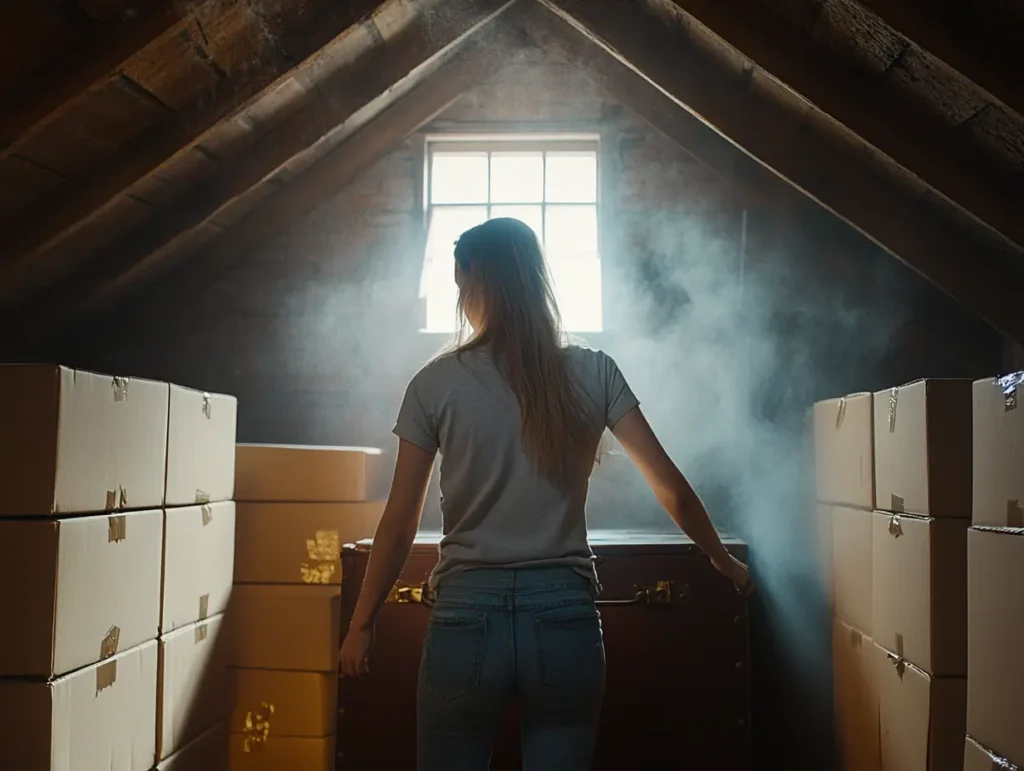
What if her father had carried on an affair, and this attic had been its hiding place? The thought made Miriam’s stomach twist. Darker questions followed. What if Ruth had been more than a lover? What if she had been family, blood? What if Miriam herself was not truly her father’s daughter at all, but the product of some hidden past?
The coldness, the distance, the way he seemed unable to look at her; had it been because she was a reminder of betrayal rather than his own flesh and blood? Her throat tightened. She could almost hear him in her memory, brushing her off, dismissing her with that tired wave of the hand. Maybe it had all been because she didn’t belong to him in the first place.

Miriam gripped the twine, her breath shallow. She told herself she had to know, no matter how painful. For a lifetime, the attic had been locked against her; now, the truth was pressing from the inside, waiting to break free. With a sharp tug, the twine gave way, the fibers snapping in her hands.
The lid lifted with a sigh of dust, and inside lay a neat bundle of photographs bound by a faded ribbon. Miriam slipped one free and froze. A woman looked back at her; dark eyes, sharp cheekbones, a mouth tilted in that same half-smile Miriam had seen in the mirror her entire life. The resemblance was undeniable, so exact it unsettled her.
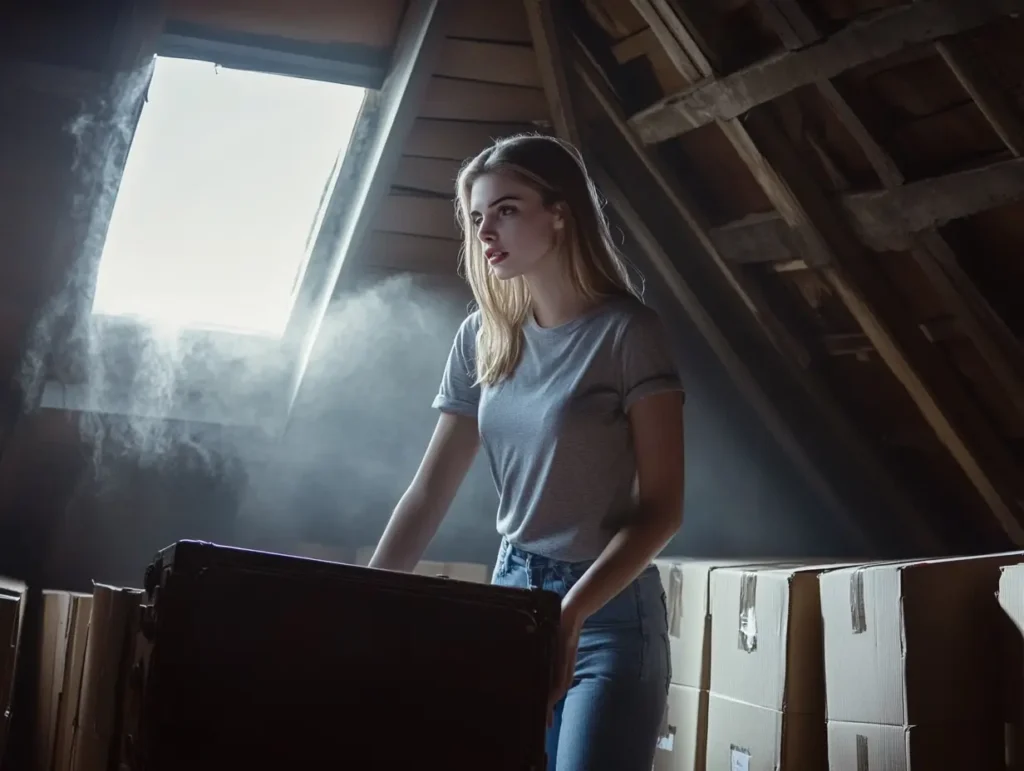
It was like staring into a reflection carried forward through decades. Photo after photo revealed the same woman in different poses: standing on a porch with a book in her lap, seated at a wedding table with her gaze turned slightly away, bundled in a coat by the water’s edge. Each image held the same commanding presence.
And beneath the stack of photos, tucked flat against the bottom of the box, was a journal bound in cracked leather. Miriam’s fingers trembled as she lifted it free. The cover was soft with wear, the pages yellowed and brittle. When she opened it, her father’s cramped handwriting sprawled across the lines, pressed so hard the ink had bled through in places.

The words at the top of the page made her stomach lurch: She decides what I will eat, what I will wear, when I may speak. She drains every room she enters. Even as a grown man, I cannot escape her voice. Mom has carved herself into me, and I don’t know how to live without her shadow pressing down.
Miriam’s breath caught. So Ruth wasn’t a lover, nor another daughter. She was his mother. Her hands shook as she turned the page, the paper crackling under her fingers. The next entry bled darker, the ink carved in with such force it nearly tore through. Mom says she only wanted the best for me. But what she wanted was obedience.

She crushed every choice before it could breathe. Even now, when I close my eyes, I hear her voice correcting me, mocking me. I left her house, but I never escaped her grip. Miriam swallowed hard and flipped further. The entries grew more fragmented, each one dripping with resentment. She makes her silence into a weapon.
Her eyes follow me even when she isn’t in the room. I swore I’d never live under her shadow again. Then she reached one dated the year she was born. The handwriting was uneven, as if written quickly, almost in panic. Miriam came into the world today. My wife smiled and said she has my mother’s eyes. I said nothing. I see it too.

The journal slipped in her lap, and she pressed her hands against her face. So that was it — the reason for every clipped word, every sharp look, every omission. She hadn’t been unwanted for who she was, but for who she resembled. She had spent her life paying for a resemblance she could never change.
She flipped a few more pages, the entries skipping years and then circling back as though he couldn’t stop reopening the same wound. One in particular made her chest tighten. That day at the lake stays with me. Miriam argued over some knot, stubborn in a way that cut deeper than it should have.

It was her tone; sharp, insistent, and for a moment I heard my mother’s voice instead of hers. The same corrections, the same certainty that I was never enough. I saw Ruth in her, clear as if she were standing there again, and I couldn’t stop myself. I pushed Miriam away. And since then, every glance has been the same.
My daughter, and not my daughter; a resemblance I cannot bear to face. Miriam pressed her hand to her mouth, the words blurring through her tears. All those years she had thought the change was her fault, that she had done something unforgivable at the lake.

And here was the truth, written in his own hand: he had mistaken her for a ghost, punishing her for echoes she had never chosen to carry. The unfairness of it burned through her. She wanted to throw the journal across the room, to scream at the memory of him, to demand why he hadn’t been stronger, why he hadn’t seen her instead of Ruth.
But he was gone, and the silence that answered was all that remained. When her sobs finally subsided, she noticed another envelope tucked beneath the journal, set apart from the rest. Her name was written on it in his unmistakable handwriting. Her name was written on the envelope in his unmistakable hand. Miriam stared at it for a long moment, her breath uneven.

After pages of bitterness and resentment, she half-feared what he might say to her directly. Still, she slid her finger under the flap and unfolded the paper inside, careful not to tear the fragile sheet. Miriam, it began, the strokes of his pen unsteady, each word pressed into the page as though it had taken effort to summon.
I don’t know how to say what should have been said a long time ago. You were never the cause of my silence, though I let you believe it. The fault was mine; the shadows I carried from before you were born. I hope one day you will forgive me for not being able to put them down in time.

Her hands trembled as she read. I cannot undo the years, but I can leave you something better than apologies. The accounts are in your name. The house will be yours if you want it. I did not want my burdens to be the reason your life was difficult. You deserved more than I could give. This is what I can leave instead.
When she lowered the letter into her lap, her tears had already blurred the ink. It wasn’t affection in the way she had always longed for, not the embrace she had imagined as a child, not the warmth she had prayed for at his bedside. But it was something, a fractured attempt at care, a final gesture from a man who could never untangle himself from his past.
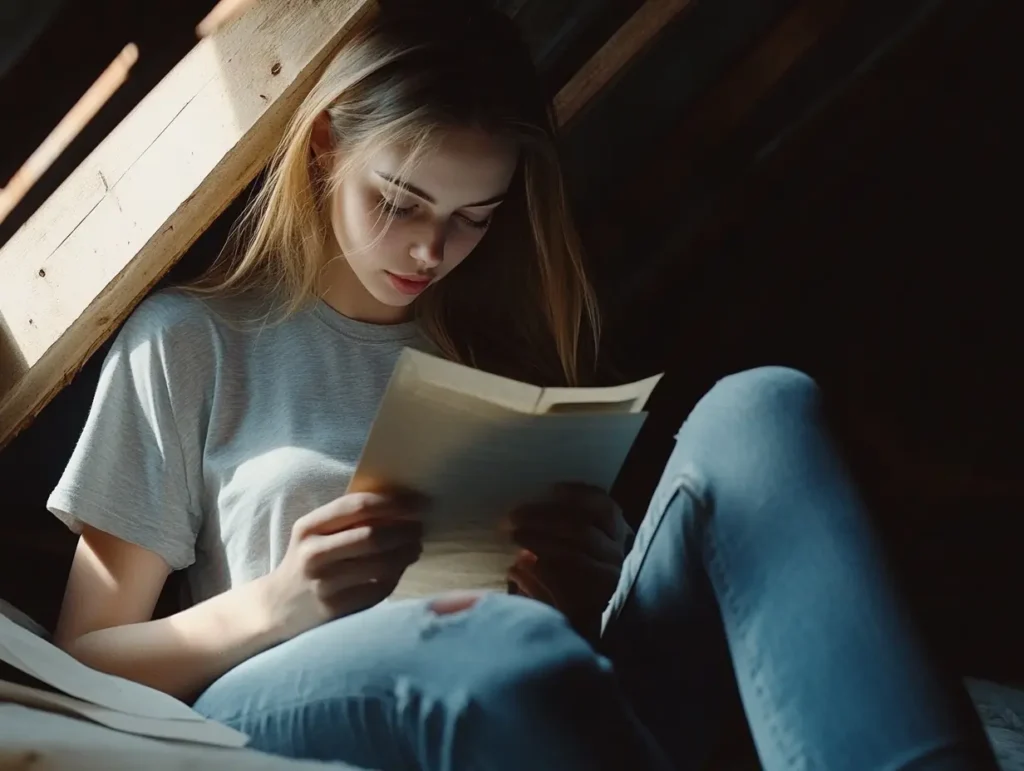
For the first time in her life, Miriam felt the shape of an answer settle in her chest. It didn’t heal the wounds, but it explained them. And in its own strange way, that was the closest her father had ever come to love.
Miriam folded the letter carefully and placed it back inside its envelope, her hands lingering on the paper as though reluctant to let go. Around her, the attic seemed less ominous than it once had, less a locked vault of shadows and more a quiet room filled with truths too heavy for him to carry aloud.

She sat there for a long time, the journal and letter resting in her lap, her tears drying into salt on her cheeks. There would be no apology, no warm embrace, no years returned to her. But there was an explanation, and in its raw imperfection, a strange kind of closure.
At last, she rose, cradling the envelope against her chest. The floorboards groaned beneath her steps as she made her way back toward the door. The air of the attic clung to her clothes; dust, age, and secrets finally set free.
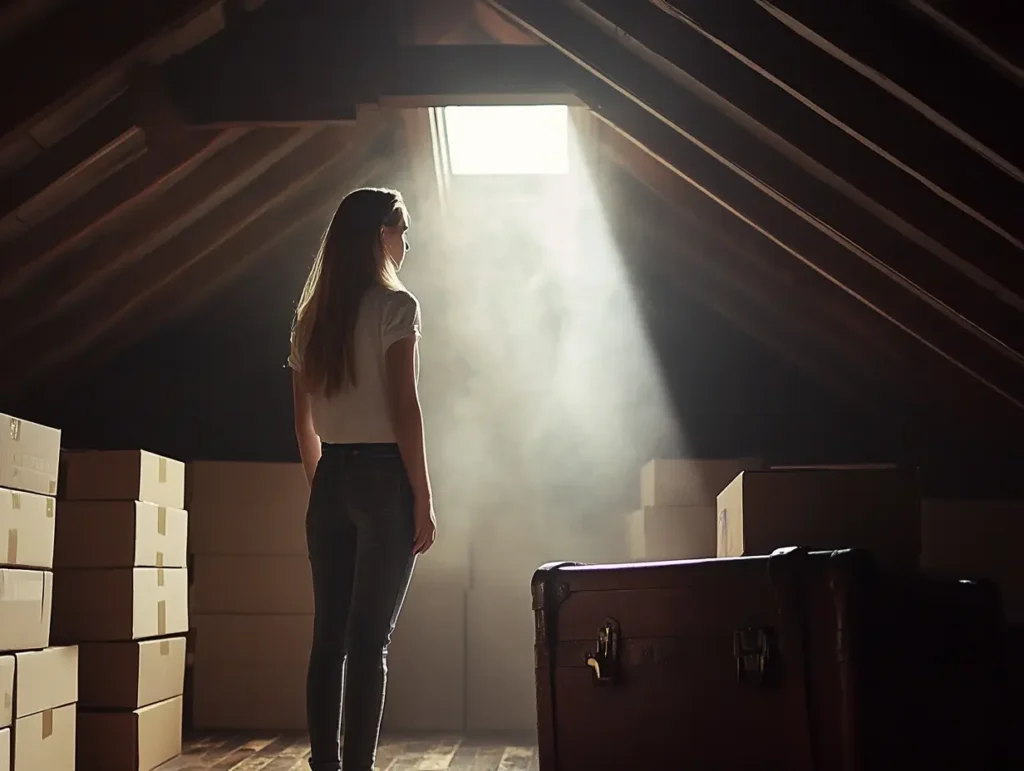
She paused at the threshold, glancing once more at the trunk in the corner, and whispered into the stillness, “I understand.” Then she stepped out, pulling the door shut behind her, leaving the attic, and her father’s silence, at last in the past.

